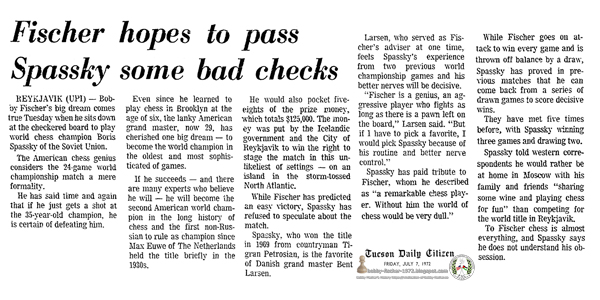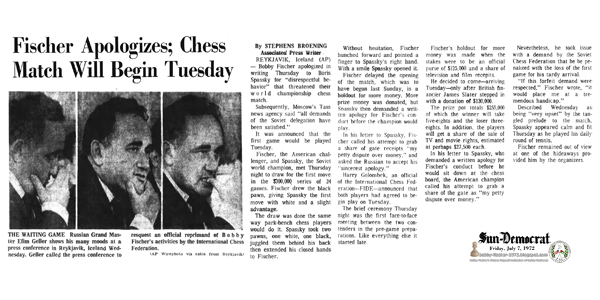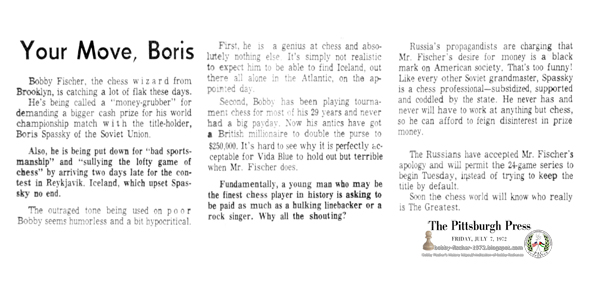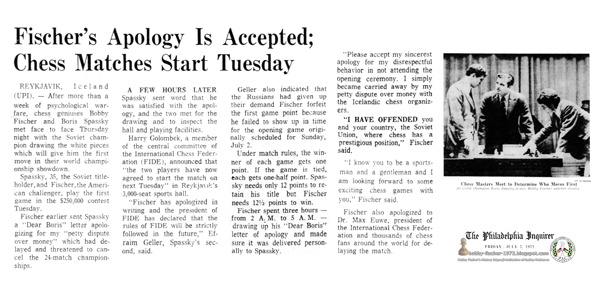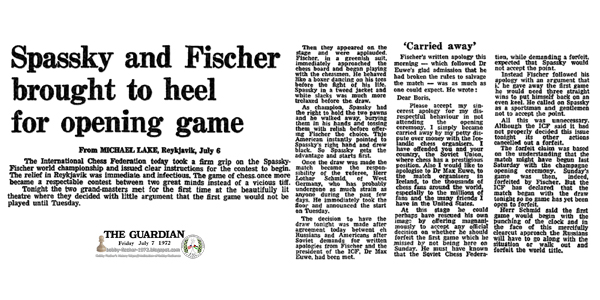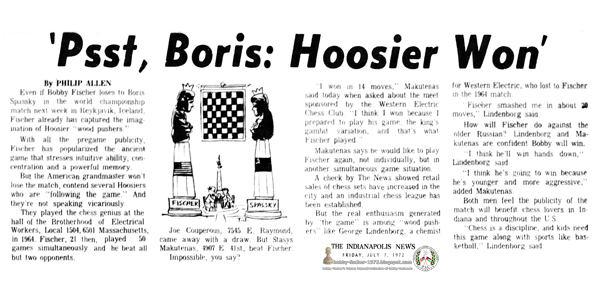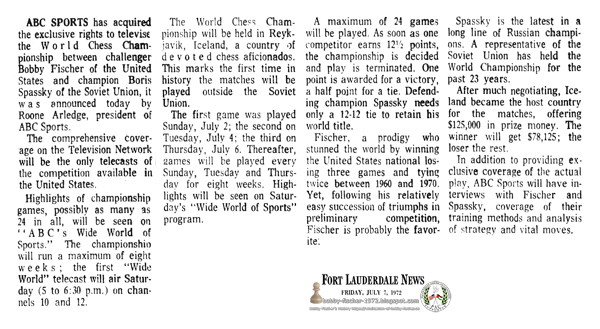The Boston Globe Boston, Massachusetts Friday, July 07, 1972 - Page 1-32
Chess Match Starts Tuesday; Spassky Wins Draw, 1st Move by Harold Dondis
Reykjavik, Iceland — With the nerve-rasping preliminaries of psychology and diplomacy cleared away, Russia's Boris Spassky and Bobby Fischer, the reluctant American, are set for the chess match of the century.
That much was settled yesterday, but in keeping with the patient patterns of the ancient game, Boris and Bobby aren't exactly rushing into anything, even now.
The two masters allowed, with courtly deliberation, that they will be prepared to make the first moves on the board next Tuesday at 1 p.m. EDT).
The agreement between the rival geniuses lifted the state of tension among officials of the International Chess Federation as well as the seemingly irritated Icelandic organizers, who expected confrontation to take place last Sunday.
The key to the resolution was a “Dear Boris” letter sent by the 29-year-old Fischer to the 35-year-old Spassky.
Among other things, Bobby apologized for what he termed his “petty dispute over money” which had threatened cancellation of the 24-match classic.
Bobby was perhaps indulging in a nice bit of understatement. The estimated prize value is between $250,000 and $300,000.
Spassky did not respond directly. His satisfaction with the conditions was expressed by his “second” Efraim Geller.
In all of this, was a good deal of face-saving and perhaps in the case of the American contender at least a little face-losing.
Bobby lost another minor point yesterday also.
This came about when the rivals met for the first time during the preliminaries, including the draw for precedence.
Fischer was 20 minutes tardy for this ceremony, but there was a polite ambiance as the two expressed satisfaction after inspecting the championship board, the lighting and other facilities on the stage of the hall where a capacity of 3000 is expected for the great event.
Spassky held a chess piece in either hand and when Fischer pointed to the left, the black piece was revealed.
By retaining the white piece, Spassky was assured of making the first move of the opening game on Tuesday.
New York Times, New York, New York, Friday, July 7, 1972 - Page 01,14
Chess Play Will Start Tuesday; Spassky Wins Draw for White by Harold C. Schonberg
Reykjavik, Iceland, July 6 — After months of bickering and battling, protests and postponements, the world championship chess match formally began today.
The champion, Boris Spassky of the Soviet Union, and the American challenger, Bobby Fischer, met, shook hands and drew for the right to play white, and make the first move in the first game, now scheduled to begin Tuesday.
The ceremony, at which Spassky won that right, took place after Fischer wrote and delivered by hand an apology to Spassky.
“Please accept my sincerest apology,” the letter said, “for my disrespectful behavior in not attending the opening ceremony.”
‘Simply Carried Away’
Fischer, who had submitted an earlier, unsigned apology that was transmitted by his second—and that was rejected by the Russians — said he “simply became carried away by my petty dispute over money ([…with the Icelandic chess organizers.” whom the Soviets had wedged out, i.e., $225,000 offered by Australia and $175,000 by Mexico. The Soviet couldn't allow that, so the lowest bid possible was mandatory to win Soviet approval.]).”
“I know you to be a sportsman and a gentleman,” Fischer said in closing, “and I am looking forward to some exciting chess games with you.”
He signed it: “Sincerely, Bobby Fischer.”
The match was originally scheduled to start last Sunday, but was postponed to Tuesday by Dr. Max Euwe, president of the International Chess Federation, when Fischer failed to show up. Dr. Euwe warned Fischer he would forfeit the match if he did not arrive by noon Tuesday.
Fischer left New York Monday night after a British millionaire doubled the $125,000 purse. He arrived five hours before the deadline.
The Soviet delegation then demanded that Fischer apologize and be punished, and that Dr. Euwe also apologize for having granted the postponement. Dr. Euwe complied—and Fischer submitted his unacceptable ([absolutely unacceptable for an authoritarian, totalitarian Empire like the Soviets whose Draconian policies would mandate the immediate transportation of a rebel like Fischer, directly to the nearest Gulag/labor camp and wait in line for the firing squad, gas chamber or worked to death til starvation; Democracy, Life liberty and the pursuit of happiness shall not be tolerated]) apology—but the resolution of the dispute did not come until today, following negotiations that lasted all night and continued well into the day.
With the dispute apparently amicably settled, Dr. Euwe left today for the Netherlands. He may return before the end of the match, which will last until Fischer scores 12½ points or Spassky scores 12 (a victory counts one point and a draw a half a point).
The winner is to get five-eighths of the purse ($156,250) and the loser three-eighths of the purse, which is more than 20 times larger than any chess purse in history.
The Russians have dropped — for the time being anyway — their demand that the first game be forfeited by the 29-year-old American. Fischer referred to this demand in his note of apology, as well as to the half-point edge Spassky has simply as the defender.
Spassky, who is 35, arrived on time for the first-move ceremony. Fischer was 20 minutes later. Both met backstage and then went onto the stage of the 2,500-seat Exhibition Hall for the draw.
This was done in the time-honored chess way of holding a black piece in one first and a white piece in the other.
The referee, Lothar Schmid, gave each player an envelope. Spassky chose the one that notified him he would hold the pieces. Spassky concealed the pieces and Fischer pointed to Spassky's left hand. The champion opened his hand to reveal a black pawn.
Fischer's face did not change expression, though the player of the black pieces is at a disadvantage. Fischer will play white in the second game, and the first move then continues to alternate.
Special Chair Flown In
Fischer will not be using the chairs provided by the Icelandic Chess Federation. Instead, he will be sitting in a special chair flown in from New York—the same one he used in his match against Tigran Petrosian of the Soviet Union.
The match with Petrosian, a former world champion, was the last chess-playing hurdle Fischer faced on his way to the championship match.
The chess board, made of inlaid marble, had some glare. It was treated with acid to reduce the glare, but Fischer has not yet made up his mind about it. He has tentatively accepted it, but attempts will be made to get one more to his liking.
During the ceremony tonight, various features of the hall were tested. Of primary interest was the screen above the stage, which has a close-up of the board. The definition tonight was not altogether clear. Much better was a diagrammatic representation, with the clocks of the players on one side. This will let the audience know the elapsed time between moves, and the time pressure problems of the players.
Each player has two and a half hours in which to make 40 moves. Games not completed at the end of five hours are to be adjourned to the following day. Games are scheduled to start at 5 P.M. on Sundays, Tuesdays and Thursdays.
After the ceremony the two players shook hands, looking at each other the way Joan Sutherland and Maria Callas would—not with love, perhaps, but with mutual respect. They were a study in contrasts—Fischer tall, lumbering, looking somewhat ill at ease; the shorter Spassky collected and smiling.
Immediately after the ceremony, Fischer left the hall and went to Keflavik Airfield to bowl at the United States Air Force base there. The base has the only bowling alley in Iceland.
The match is being delayed until Tuesday to give both players a chance to recover from the nervous strain of the last few days. In general, Spassky and Fischer seemed pleased with the physical surroundings of the hall, though Fischer has reserved judgment. He wants to return and examine the stage and its lighting at his leisure.
During the day, there was a threat from the American delegation that a Sunday game was mandatory. Fischer was eager to play on Sunday, and it was with difficulty that he was persuaded to go along with the Tuesday opening. The American delegation works entirely in accordance with the American grand master's wishes. “We will insist on whatever Fischer wants us to do,” one member said.
New York Times, New York, New York, Friday, July 7, 1972 - Page 14
Chess Is Game of Skill — With Some Luck by Richard Roberts
Unlike poker, craps, Monopoly, bridge or love, chess is absolutely devoid of the element of chance. Or so most people think.
It is a game of skill, all skill and nothing but skill; cool, absolutely, totally logical. A game in which two minds meet and clash in a never-never land of pure reason.
And so it is—up to a point.
True, there is no luck of the deal, as there is in poker or bridge, and there are no repeated throws of the dice, the way there are in craps or Monopoly (though there were, in the Middle Ages).
But there is a good deal of emotion—with some people it is passion—which perhaps makes chess closer to love than to poker. And there is at least one small element of luck, in the form of the first move.
The privilege of making the first move is determined by a drawing of lots, a flip of a coin, a toss of a die. And to the winner of the draw, the flip or the toss goes a host of advantages, some almost tangible, some as difficult to define or formalize as the shifting shapes of an early-morning mist.
The player who makes the first move—and it is always with the white pieces— chooses the king of game that will follow. Not the details, of course, because the tactics, the specific moves, must be worked out as the game develops. But he sets the over-all tone, the strategy.
If he is strong on speed and hard-hitting tactics, he will choose an opening that suits that style of play. If his forte is quiet, positional chess—the kind that builds slowly, unspectacularly but inexorably—he will steer the game into those channels.
The first player, too, is always one move up on his opponent — unless he missteps and throws a move away.
That advantage of being a move ahead is known in the chess world as the initiative. It is the second player's — Black's — job to wrest the initiative from White, or at least to neutralize it.
After the first game of a match, in which chance determines who plays white, the players alternate in having the first move.
In a theoretical game between two theoretically equal players making theoretically correct moves, the theoretical ending is foregone: White, the player holding the initiative, must win.
But theory quickly parts company with reality over the chessboard. Players—even grandmasters—slip up, overlook opportunities, blunder. They underestimate their opponents or overestimate themselves.
Bobby Fischer and Boris Spassky have met before. Spassky has won three of their last five games, and two have been drawn. The Fischer mystique has not seemed to work in Spassky's case.
But then, Fischer and Spassky have not met since Fischer's mystique began working full time.
The winner of the coin-toss (or whatever else is used to pick White in the first game) will enjoy the almost-tangible advantage of the initiative. He will also enjoy the psychological advantage of, in a sense, calling the tune. And, if he plays without error, nursing his one-move advantage, he will wind up with the much more potent psychological advantage of taking the lead in the match.
[Caption: Gudmundur Thorarinsson, head of the Icelandic Chess Federation, directs Boris Spassky, right, and Bobby Fischer in drawing for first move at formal start of Reykjavik match.]
New York Times, New York, New York, Friday, July 7, 1972 - Page 14
Text of Fischer's Apology
Reykjavik, Iceland, July 6 (UPI) — Following is the text of Bobby Fischer's letter to Boris Spassky:
Dear Boris,
Please accept my sincerest apology for my disrespectful behavior in not attending the opening ceremony. I simply became carried away by my petty dispute over money with the Icelandic chess organizers. I have offended you and your country, the Soviet Union, where chess has a prestigious position.
Also, I would like to apologize to Dr. Max Euwe, president of FIDE [Federation Internationale des Echecs] to the match organizers in Iceland, to the thousands of chess fans around the world and especially to the millions of fans and the many friends I have in the United States.
After I did not show up for the first game, Dr. Euwe announced that the first game would be postponed without prejudice to me. At that time, you made no protest. Now I am informed that the Russian Chess Federation is demanding that the first game be forfeited to you. The timing of this demand seems to place in doubt the motives for your federations not insisting at the first for a forfeit of the first game.
If this forfeit demand were respected, it would place meat a tremendous handicap. Even without this handicap, you will have an advantage to begin with of needing 12 points out of 24 to retain your title, whereas I will need 12.5 to win the world title.
If this demand were granted, you would need only 11 points out of 23 but I would still need 12.5 out of my 23. In other words, I must win three game without losses, just to obtain the position you would have at the beginning of the match and [I] don't believe that the world champion desires such an advantage in order to play me.
I know you to be sportsman and a gentleman, and I am looking forward to some exciting chess games with you.
Sincerely, Bobby Fischer
Tucson Daily Citizen Tucson, Arizona Friday, July 07, 1972 - Page 7
Fischer Hopes To Pass Spassky Some Bad Checks
Reykjavik (UPI)—Bobby Fischer's big dream comes true Tuesday when he sits down at the checkered board to play world chess champion Boris Spassky of the Soviet Union.
The American chess genius considers the 24-game world championship match a mere formality.
He has said time and again that if he just gets a shot at the 35-year-old champion, he is certain of defeating him.
Even since he learned to play chess in Brooklyn at the age of six, the lanky American grand master, now 29, has cherished one big dream — to become the world champion in the oldest and most sophisticated of games.
If he succeeds — and there are many experts who believe he will — he will become the second American world champion in the long history of chess and the first non-Russian to rule as champion since Max Euwe of The Netherlands held the title briefly in the 1930s.
He would also pocket five-eights of the prize money, which totals $125,000. The money was put by the Icelandic government and the City of Reykjavik to win the right to stage the match in this unlikeliest of settings — on an island in the storm-tossed North Atlantic.
While Fischer has predicted an easy victory, Spassky has refused to speculate about the match.
Spassky, who won the title in 1969 from countryman Tigran Petrosian, is the favorite of Danish grand master Bent Larsen.
Larsen, who served as Fischer's adviser at one time, feels Spassky's experience from two previous world championship games and his better nerves will be decisive.
“Fischer is a genius, an aggressive player who fights as long as there is a pawn left on the board,” Larsen said. “But if I have to pick a favorite, I would pick Spassky because of his routine and better nerve control.”
Spassky has paid tribute to Fischer, whom he described as “a remarkable chess player. Without him the world of chess would be very dull.”
While Fischer goes on attack to win every game and is thrown off balance by a draw, Spassky has proved in previous matches that he can come back from a series of drawn games to score decisive wins.
They have met five times before, with Spassky winning three games and drawing two.
Spassky told western correspondents he would rather be at home in Moscow with his family and friends “sharing some win and playing chess for fun” than competing for the world title in Reykjavik.
To Fischer chess is almost everything, and Spassky says he does not understand his obsession.
Pensacola News Journal Pensacola, Florida Friday, July 07, 1972 - Page 38
Repentant Bobby Fischer Offers His 'Sincerest Apology' to Spassky
Reykjavik, Iceland (AP)—Repentant Bobby Fischer offered his 'sincerest apology' in writing to Boris Spassky on Thursday for “disrespectful behavior” that threatened to torpedo their $300,000 match for the world chess championship.
The American challenger's apology was delivered to the Russian champion during the morning in an unblocking move that opened the way for the start of the 24-game series, plagued by delay, confusion and bad feeling.
Officials of the International Chess Federation —FIDE— said they “hope” the match could begin on Sunday. Harry Golombek, a member of FIDE's central committee, said Tuesday should be the latest time for a start.
Fischer delayed the opening of the match, which was to have begun last Sunday, in a holdout for more money. The stakes then were an official purse of $125,000 and a share of TV and film receipts.
He decided to come—arriving Tuesday—only after British financier James Slater stepped in with a donation of $130,000 to sweeten the prize pot.
It totals $255,000 of which the winner will take five-eights and the loser three-eights. In addition, the players will get a share of the sale of TV and movie rights, estimated at perhaps $27,500 each.
In his letter to Spassky, who demanded a written apology for Fischer's conduct before he would sit down at the chess board, the American champion called his attempt to grab a share of the gate as “my petty dispute over money.”
“I have offended you and your country, the Soviet Union, where chess has a prestigious position,” Fischer wrote.
Nevertheless, he took issue with a demand by the Soviet Chess Federation that he be penalized with the loss of the first game for his tardy arrival.
“If this forfeit demand were respected,” Fischer wrote, “It would place me at a tremendous handicap,” he added that he didn't believe “the world's champion desires such an advantage in order to play me.”
The Russians says Spassky probably wouldn't accept a forfeiture.
“I know you to be a sportsman and a gentleman, and I am looking forward to some exciting chess games with you.” Fischer concluded.
The letter was the second apology Fischer had offered Spassky in as many days. In a statement read to the press Wednesday Fischer said he was “sorry” the match had been delayed and that Spassky had been “inconvenienced.” This acceptance of responsibility was apparently not enough to satisfy the Russian.
The note to Spassky, couched in conciliatory language, began: “Please accept my sincerest apology for my disrespectful behavior in not attending the opening ceremony (July 1). I simply became carried away by my petty dispute over money with the Icelandic chess organizers.”
Described Wednesday as being “very upset” by the tangled prelude to the match, Spassky appeared calm and fit Thursday as he played his daily round of tennis with Russian companion Jivo Nei.
He joked with photographers, signed autographs for kids and demonstrated that the postponement had allowed him to improve his tennis game.
Fischer remained out of view, apparently sleeping, at one of the hideaways provided him by the organizers.
Daily News New York, New York Friday, July 07, 1972 - Page 250
Bobby and Boris Show Tuesday
Reykjavik, July 6 (UPI) — The world chess championship match between Bobby Fischer of the United States and Soviet world champion Boris Spassky will start Tuesday with Spassky playing the white pieces and making the first move in the opening game. The drawing followed Fischer's written apology to Spassky for his “disrespectful behavior” in delaying the match.
Fischer, 29, the chess genius from Brooklyn, and Spassky, 35, the world titleholder from Moscow, met face to face for the first time tonight to arrange the start of their match after Fischer attributed the delay of his “petty dispute over money.”
The match was scheduled to start last Sunday, but was postponed until Tuesday while Fischer bargained for more money. It was postponed a second time after Spassky protested Fischer's absence and demanded an apology. The Russian Chess Federation also demanded that Fischer forfeit the first game because he was absent for the opening ceremony.
Fischer spent three hours— from 2 a.m. to 5 a.m.— drawing up his “Dear Boris” letter of apology and made sure it was delivered personally to Spassky.
“Please accept my sincerest apology for my disrespectful behavior in not attending the opening ceremony. I simply became carried away by my petty dispute over money with the Icelandic chess organizers,” Fischer wrote.
“I have offended you and your country, the Soviet Union, where chess has a prestigious position.”
Fischer also asked Spassky to withdraw the demand that he forfeit the first game. He said such a move would “place me at a tremendous handicap” and he did not believe “the world champion desires such an advantage in order to play me.”
“I know you to be a sportsman and a gentleman and I am looking forward to some exciting chess games with you,” Fischer said.
Fischer also apologized to Dr. Max Euwe, president of the International Chess Federation, and thousands of chess fans around the world for delaying the match.
Instead of going to Iceland for the scheduled start of the match, Fischer stayed in New York and demanded more money. A British banker, James Slater, agreed to double the original $125,000 so the match could be played.
Fischer then flew to Iceland and went into seclusion in a house put at his disposal by the match organizers.
The Chico Enterprise-Record Chico, California Friday, July 07, 1972 - Page 6
Fischer, Spassky Agree: Chess Competition to Begin Tuesday
Reykjavik, Iceland (UPI) —After two weeks of behind-the-scene diplomacy and much talking, Bobby Fischer and Boris Spassky have agreed to get down to their real business —playing chess.
The match for the world title now held by the 35-year-old Russian will begin Tuesday in the Icelandic capital. The winner gets $150,000 and the loser $100,000.
Spassky, a handsome Leningrad journalist who makes a living playing chess the year around, will make the first move. He won the draw Thursday night and will play white, meaning he will make the first move. The 29-year-old American will play Black in the first game. In succeeding games they alternate.
Despite the charges and counter-charges exchanged between the two camps there was no sign of personal animosity between the two.
When Spassky was introduced at the draw, Fischer applauded. And when the challenger, dressed in a green suit and red tie, was presented, Spassky gave him a big hand.
As they shook hands at the end of the ceremony, Spassky held on to Fischer's hand and said, “And good luck.”
The ceremony confirmed that all the problems that delayed the match for nine days finally had been settled.
It began with Fischer refusing to come to Iceland for the originally scheduled start July 2 because he was not happy with the financial terms.
Jim Slater, a wealthy British banker, saved the match when he offered to double the prize money from $125,000 to $250,000.
Fischer finally turned up July 4—but by then, Spassky was upset and threatened to pull out. He first demanded that Fischer forfeit the first game, then asked for an apology from the American and finally asked Dr. Max Euwe, president of the International Chess Federation (FIDE), to admit that he violated the rules when he postponed the match in Fischer's absence instead of disqualifying the American.
Euwe, himself a former world champion and the last non-Russian to hold the title, promptly penned a declaration admitting that he had made a mistake.
Thursday, Fischer broke the ice when he wrote a letter to “Dear Boris” apologizing for his “disrespectful behavior.” Fischer admitted he had “offended you and your country, the Soviet Union.”
“I simply became carried away by my petty dispute over money with the Icelandic chess organizers,” Fischer wrote in his letter.
Spassky accepted the apology, although it was not delivered directly to him by Fischer.
In the end, the Russians appeared to have dropped their demand that Fischer forfeit the first game.
The Paducah Sun Paducah, Kentucky Friday, July 07, 1972 - Page 1
Fischer Apologizes; Chess Match Will Begin Tuesday by Stephens Broening
Reykjavik, Iceland (AP) — Bobby Fischer apologized in writing Thursday to Boris Spassky for “disrespectful behavior” that threatened their world championship chess match.
Subsequently, Moscow's Tass news agency said “all demands of the Soviet delegation have been satisfied.”
It was announced that the first game would be played Tuesday.
Fischer, the American challenger, and Spassky, the Soviet world champion, met Thursday night to draw for the first move in the $300,000 series of 24 games. Fischer drew the black pawn, giving Spassky the first move with white and a slight advantage.
The draw was done the same way park-bench chess players would do it. Spassky took two pawns, one white, one black, juggled them behind his back then extended his closed hands to Fischer.
Without hesitation, Fischer hunched forward and pointed a finger to Spassky's right hand. With a smile Spassky opened it.
Fischer delayed the opening of the match, which was to have begun last Sunday, in a holdout for more money. More prize money was donated, but Spassky then demanded a written apology for Fischer's conduct before the champion would play.
In his letter to Spassky Fischer called his attempt to grab a share of gate receipts “my petty dispute over money,” and asked the Russian to accept his “sincerest apology.”
Harry Golombek, an official of the International Chess Federation—FIDE—announced that both players had agreed to begin play on Tuesday.
The brief ceremony Thursday night was the first face-to-face meeting between the two contenders in the pre-game preparations. Like everything else it started late.
Spassky was the first to arrive, coming 10 minutes before the scheduled start. The first question the Russians with him asked when they got backstage was, “Has Fischer come?”
The answer was no. Fischer showed up 22 minutes late.
Wearing a light-green three-piece suit, Fischer sat at the board chatting with Spassky before the ceremony began. There were no handshakes.
When he walked onstage at the Sports Palace, Fischer moved briskly to the side of the board with the white pieces. He lifted the white queen, tested its weight. Then he did the same with all 16 pieces as he kept one hand stuffed in his pocket.
He sat down bending his tall frame into an armchair. Spassky, a shorter man, followed suit, putting his elbows on the edge of the table.
Fischer's holdout for more money was made when the stakes were to be an official purse of $125,000 and a share of television and film receipts.
He decided to come—arriving Tuesday—only after British financier James Slater stepped in with a donation of $130,000.
The prize pot totals $255,000 of which the winner will take five-eighths and the loser three-eighths. In addition, the players will get a share of the sale of TV and movie rights, estimated at perhaps $27,500 each.
In his letter to Spassky, who demanded a written apology for Fischer's conduct before he would sit down at the chess board, the American champion called his attempt to grab a share of the gate as “my petty dispute over money.”
Nevertheless, he took issue with a demand by the Soviet Chess Federation that he be penalized with the loss of the first game for his tardy arrival.
“If this forfeit demand were respected,” Fischer wrote, “it would place me at a tremendous handicap.”
Described Wednesday as being “very upset” by the tangled prelude to the match, Spassky appeared calm and fit Thursday as he played his daily round of tennis.
Fischer remained out of view at one of the hideaways provided him by the organizers.
★
[Caption: THE WAITING GAME. Russian Grand Master Efim Geller shows his many moods at a press conference in Reykjavik, Iceland Wednesday. Geller called the press conference to request an official reprimand of Bobby Fischer's activities by the International Chess Federation.]
The Pittsburgh Press Pittsburgh, Pennsylvania Friday, July 07, 1972 - Page 18
Your Move, Boris
Bobby Fischer, the chess wizard from Brooklyn, is catching a lot of flak these days.
He's being called a “money-grubber” for demanding a bigger cash prize for his world championship match with the title-holder, Boris Spassky of the Soviet Union.
Also, he is being put down for “bad sportsmanship” and “sullying the lofty game of chess” by arriving two days late for the contest in Reykjavik, Iceland, which upset Spassky [to] no end.
The outraged tone being used on poor Bobby seems humorless and a bit h*p*cr*t*c*l.
First, he is a genius at chess and absolutely nothing else. It's simply not realistic to expect him to be able to find Iceland, out there all alone in the Atlantic, on the appointed day.
Second, Bobby has been playing tournament chess for most of his 29 years and never had a big payday. Now his antics have got a British millionaire to double the purse to $250,000. It's hard to see why it is perfectly acceptable for Vida Blue to hold out but terrible when Mr. Fischer does.
Fundamentally, a young man who may be the finest chess player in history is asking to be paid as much as a hulking linebacker or a rock singer. Why all the shouting?
Russia's propagandists are charging that Mr. Fischer's desire for money is a black mark on American society. That's too funny! Like every other Soviet grandmaster, Spassky is a chess professional—subsidized, supported and coddled by the state. He never has and never will have to work at anything but chess, so he can afford to feign disinterested in prize money.
The Russians have accepted Mr. Fischer's apology and will permit the 24-game series to begin Tuesday, instead of trying to keep the title by default.
Soon the chess world will know who really is The Greatest.
The Philadelphia Inquirer Philadelphia, Pennsylvania Friday, July 07, 1972 - Page 3
Fischer's Apology Is Accepted; Chess Matches Start Tuesday
Reykjavik, Iceland (UPI). — After more than a week of psychological warfare ([From the Soviet Empire's side. Fischer knew the value of the match and the Soviet attempted to strong-arm a devaluation to approximately HALF the value, {i.e., Australia offered bid at $225,000, Mexico's bid at $175,000} as part of their “psychological warfare” campaign against Fischer. No empire is innocent, especially a power-frenzied behemoth like the U.S.S.R. and it was, after all, the U.S.S.R. with its worldwide network of rabble rousers in media networks, vs. the wits of one soul, Robert J. Fischer who couldn't even be quoted correctly half the time, whose words were either taken out of context or words following the Soviet narrative, put in his mouth]), chess geniuses Bobby Fischer and Boris Spassky met face to face Thursday night with the Soviet champion drawing the white pieces which will give him the first move in their world championship showdown.
Spassky, 35, the Soviet titleholder, and Fischer, the American challenger, play the first game in the $250,000 contest Tuesday.
Fischer earlier sent Spassky a “Dear Boris” letter apologizing for my “petty dispute over money” ([A token apology, for had the stakes not be raised to their correct value, it's unlikely Fischer would've appeared for the match … with the Soviet demanding acceptance of peanuts as payment for performing “circus tricks” like a monkey or an elephant. “Here Bobby… here's a banana. Be satisfied,” croaks the Kremlin. Yes, Fischer demanded more, and rightly so]) which had delayed and threatened to cancel the 24-match championships ([the SOVIET threw up roadblocks, such as refusal to directly communicate person to person, which assuredly caused severe delays of the match; Ken Smith testified literal plots to cancel Fischer and replace the challenger as Petrosian, throughout the Spring months of 1972. Smith refers to them as “old hands” in Belgrade and Reykjavik. Those apologies are five decades overdue!]).
A FEW HOURS LATER Spassky sent word that he was satisfied with the apology, and the two met for the drawing and to inspect the hall and playing facilities.
Harry Golombek, a member of the central committee of the International Chess Federation (FIDE), announced that “the two players have now agreed to start the match on next Tuesday” in Reykjavik's 3,000-seat sports hall.
“Fischer has apologized in writing and the president of FIDE has declared that the rules of FIDE will be strictly followed in the future,” Efim Geller, Spassky's second, said.
Geller also indicated that the SOVIET EMPIRE had given up their ([excessive]) demand Fischer forfeit the first game point because he failed to show up in time for the opening game originally scheduled for Sunday, July 2.
Under match rules, the winner of each game gets one point. If the game is tied, each gets one-half point. Spassky needs only 12 points to retain his title but Fischer needs 12½ points to win.
Fischer spent three hours— from 2 a.m. to 5 a.m. — drawing up his “Dear Boris” letter of apology and made sure it was delivered personally to Spassky.
“Please accept my sincerest apology for my disrespectful behavior in not attending the opening ceremony. I simply became carried away by my petty dispute over money with the Icelandic chess organizers.” ([Have they apologized for their petty racism, discrimination and anti-American attitudes and policies? No. Both Russian and Icelandic wrongly believing they have done nothing wrong for the past 71 years!])
“I HAVE OFFENDED you and your country, the Soviet Union, where chess has a prestigious position,” Fischer said.
“I know you to be a sportsman and a gentleman and I am looking forward to some exciting chess games with you,” Fischer said.
Fischer also apologized to Dr. Max Euwe, president of the International Chess Federation and thousands of chess fans around the world for delaying the match. ([Fischer did exactly what any American sportsman would do when organizers were holding out on equitable share of profits! So an “apology” was completely unnecessary, but a technicality demanded by the Soviet Empire's powerful worldwide network of smear campaign professionals.])
Courier-Post Camden, New Jersey Friday, July 07, 1972 - Page 38
Russian World Champion to Make First Move: Spassky Drops His Demand for Forfeit, Chess Match With Fischer Begins Tuesday
Reykjavik, Iceland (UPI) — Russian Boris Spassky has agreed to drop his demand that American Bobby Fischer be penalized one game for delaying the start of the world championship chess match, U.S. chess sources said today.
Fred Cramer, a vice president in the U.S. Chess Federation, said Spassky and Fischer worked out the details of their agreement in a backstage room in Reykjavik's main sports hall yesterday a few minutes before the two met publicly to draw lots to see who would get the first move.
Before the meeting, the Russian Chess Federation had demanded that Fischer be ordered to forfeit the first game because he caused the initial postponement. At that time the match was scheduled to begin July 9, one week late.
Agreed On Tuesday
Cramer said that to salve Soviet pride Fischer agreed to postpone the start until Tuesday if Spassky would drop the demand for a forfeit.
“Bobby would have liked to start play on Sunday but we agreed to another postponement. The Russians apparently felt we had done it once to them and now they wanted to do it to us,” Cramer said.
Spassky and Fischer will play the first game in the $250,000 tournament on Tuesday, nine days after the scheduled start.
Spassky, a handsome Leningrad journalist who makes a living playing chess the year around, will make the first move. He won the draw last night and will play white, meaning he will make the first move. The 29-year-old American will play black in the first game. In succeeding games they alternate.
Despite the charges and counter-charges exchanged between the two camps there was no sign of personal animosity between the two.
When Spassky was introduced at the draw, Fischer applauded. And when the challenger, was presented, Spassky gave him a big hand.
As they shook hands at the end of the ceremony, Spassky held on to Fischer's hand and said, “And good luck.”
The ceremony confirmed that all the problems that delayed the match for nine days finally had been settled.
It began with Fischer refusing to come to Iceland for the originally scheduled start July 2 because he was not happy with the financial terms.
Jim Slater, a wealthy British banker, saved the match when he offered to double the prize money from $125,000 to $250,0000.
Fischer finally turned up July 4—but by then, Spassky was upset and threatened to pull out. He first demanded that Fischer forfeit the first game, then asked for an apology from the American and finally asked Dr. Max Euwe, president of the International Chess Federation (FIDE), to admit that he violated the rules when he postponed the match in Fischer's absence instead of disqualifying the American ([because the Soviet was quite guilty of seeking any opportunity or excuse to delay and derail the match since the early months of 1972, which led to Fischer's apprehension to arrive in Iceland on the assigned date. But long overdue apologies spanning five decades will not be forthcoming due to deeply ingrained Soviet Empire's egocentricity]).
Admitted Mistake
Euwe, himself a former world champion and the last non-Russian to hold the title, promptly penned a declaration admitting that he had made a mistake.
Thursday, Fischer broke the ice when he wrote a letter to “Dear Boris” apologizing for his “disrespectful behavior.” Fischer admitted he had “offended you and your country, the Soviet Union.”
“I simply became carried away by my petty dispute over money ([no different than the Soviet's “petty dispute” over money, when it threw a fit, demanding the entire match be staged in what the Soviet was fully aware, as an Anti-American, extremely racist haven of intolerance, with the lowest bid among all nations who cast bids — so that Fischer would be surrounded by bitter Anti-American tirades by Icelandic and Pro-Soviet nationalism … needless to mention, but black people around the world were not welcome, of course, as well as squeezing Fischer out of a chance at the additional $100,000 offered by Australia or an additional $50,000 offered by Mexico to host the tournament. Petty squabbles were on par with desperate graspings of their red tape Soviet bureaucrats' insatiable appetite for ever more imperial power]) with the Icelandic chess organizers,” Fischer wrote in his letter ([and rightly so done.])
Spassky accepted the apology, although it was not delivered directly to him by Fischer ([because the Soviet bureaucrats felt an oral apology was not profitable enough. They demanded it in writing for propaganda purposes in their smear factory]).
In the end, the Russians appeared to have dropped their demand that Fischer forfeit the first game.
The Record Hackensack, New Jersey Friday, July 07, 1972 - Page 4
Spassky Will Play First Tuesday
LA Times News Service. Reykjavik, Iceland—The world chess championship competition formally opened last night after a five-day delay and a comedy of errors which often threatened to reduce the noble sport to a $250,000 farce.
The opening ceremony was as unorthodox as the preliminaries were unprecedented. It consisted of a draw for the right to play white, or first, in the opening game between defending world champion Boris Spassky of Russia and American challenger Bobby Fischer.
Spassky won. He also won the apparent last battle in the struggle for cash, position, and prestige which has waxed hot here since the preliminaries began a week ago.
The champion refused to play the first of 24 scheduled games Sunday, and said he would begin Tuesday. Fischer, who had wanted to play Sunday, did not object.
First Challenge
Still not cleared up was the heated issue of whether Fischer should be penalized the first game. The Soviets demanded this, but agreed to put it aside and get on with the match, the first challenge to Soviet domination of championship chess in 35 years.
Fischer has demanded that chess professionals be paid as well as other professional sportsmen.
The original threats posed by Fischer were further complicated by the desperate effort of the World Chess Federation and its Icelandic chapter to make sure the match didn't collapse. They bent over backwards to satisfy Fischer, then had to do the same for Spassky when he began making his own demands.
The situation was further complicated by the cold war overtones of an American challenger playing a Soviet champion.
The drawing ceremony lasted 12 minutes. The two players appeared in the hall 40 minutes late, Fischer in a green suit and Spassky in his salt-and-pepper sports jacket and slacks. The two of them were followed by their dark-suited teams of advisers, seconds, and the like.
Fischer appeared relaxed, Spassky a bit uptight. Both fooled around with pieces on the board for a while as grand master Harry Golombek introduced them and their various lieutenants.
The drawing ceremony started with both men receiving a white envelope. Inside one was a paper signifying that the owner had to pick up a black and a white pawn, mix them up, and hold them out to the other.
Spassky won. He broken into a smile for the first time during the ceremony, walked a few paces back and returned, holding out both fists.
Fischer did not hesitate. He picked Spassky's right hand—the black pawn. Spassky plays first Tuesday.
“The first step has been taken,” said chief arbiter Lothar Schmid. Curiously, he did not declare the match open. The shocks of the past week have made him cautious.
Fischer gave Spassky a swift handshake and turned to leave. Spassky tightened his grip on Fischer's hand and pulled him back.
“And good luck,” Spassky said.
Chippewa Herald-Telegram Chippewa Falls, Wisconsin Friday, July 07, 1972 - Page 1
Go Get Him, Bobby!
“The number of times we have pulled for a Russian over an American can be chalked up with a zero,” the Wisconsin State Journal said in its editorial columns yesterday.
But regardless of this admirable record, the Madison newspaper is admittedly pulling for Russian Boris Spassky in the world championship of chess over American Bobby Fischer.
Editorializing somewhat noisily, the State Journal editorial claimed (a little pompously, we think), “A good share of the public is getting tired of the arrogant attitude many of our ‘sports figures’ have been displaying lately, and happily will welcome a comedown for them.”
“Bobby Fischer,” the editorial continued, “has epitomized all that is worst about the erroneous American image abroad — the greedy, money-grabbing ‘sportsman’ who plays the game only for what it pays him.”
“So,” the State Journal trumpeted, “we're in your corner now, Boris, and we know enough to be quiet.”
Quiet? Calling the greatest chess talent in the word (and Bobby Fischer will prove this if Spassky ever finds the fortitude to play him) greedy and arrogant is quiet?
We hope that the State Journal isn't serious about backing the Russian simply because Fischer has enough business acumen to demand and get adequate pay for his work.
Fischer was born with a machine-like mind, and he has developed his thinking process to the point where he can out-maneuver any other human being on a chessboard.
Sure he is outgoing, demanding—and, perhaps, just a little bit arrogant.
And in our estimation, he should be.
He is the best—and he knows it!
We think that Fischer, instead of epitomizing “all that is worst about the American image abroad (as the State Journal claims), instead presents an example of a tough-minded American businessman who has the guts and good sense to parley his special talent into a solid subsistence.
Being the world's best chess player isn't, after all, comparable to being a champion hula-hooper.
So, the Herald-Telegram, in its small way, would like to counter the State Journal's misguided endorsement of Boris Spassky with a solid vote of confidence for Bobby Fischer in his upcoming championship series with the Russian.
Go get him, Bobby!
The Guardian London, Greater London, England Friday, July 07, 1972 - Page 4
Spassky and Fischer Brought to Heel for Opening Game from Michael Lake
Reykjavik, July 6 — The International Chess Federation today took a firm grip on the Spassky-Fischer world championship and issued clear instructions for the contest to begin. The relief in Reykjavik was immediate and infectious. The game of chess once more became a respectable contest between two great minds instead of a vicious tiff.
Tonight the two grand-masters met for the first time at the beautifully lit theater where they decided with little argument that the first game would not be played until Tuesday.
Then they appeared on the stage and were applauded. Fischer, in a greenish suit, immediately approached the chess board and began playing with the chess men. He behaved like a boxer dancing on his toes before the fight of his life. Spassky in a tweed jacket and white slacks was much more relaxed before the draw.
As champion, Spassky had the right to hold the two pawns and he walked away, burying them in his hands and tossing them with relish before offering Fischer the choice. The American instantly pointed to Spassky's right hand and drew black. So Spassky gets the advantage and starts first.
Once the draw was made the match became the responsibility of the referee, Herr Lothar Schmid, of West Germany, who has probably undergone as much strain as anyone during the past few days. He immediately took the floor and announced the start on Tuesday.
The decision to have the draw tonight was made after an agreement today between the Russians and Americans after Soviet demands for written apologies from Fischer and the president of the ICF, Dr. Max Euwe, had been met.
‘Carried Away”
Fischer's written apology this morning — which followed Dr. Euwe's glad admission that he had broken the rules to salvage the match — was as much as one could expect. He wrote:
Dear Boris,
Please accept my sincerest apology for my disrespectful behavior in not attending the opening ceremony. I simply became carried away by my petty dispute over money with the Icelandic chess organizers. I have offended you and your country, the Soviet Union, where chess has a prestigious position. Also I would like to apologize to Dr. Max Euwe, to the match organizers in Iceland, to the thousands of chess fans around the world, especially to the millions of fans and the many friends I have in the United States.
At this stage he could perhaps have rescued his own image by offering magnanimously to accept any official decision on whether he should forfeit the first game which he missed by not being here on Sunday. He must have known that the Soviet Chess Federation, while demanding a forfeit, expected that Spassky would not accept the point.
Instead Fischer followed his apology with an argument that if he gave away the first game he would need three straight wins to put himself back on an even keel. He called on Spassky as a sportsman and gentleman not to accept the point.
All this was unnecessary. Although the ICF said it had not properly decided this issue tonight its other actions canceled out a forfeit.
The forfeit claim was based on the understanding that the match might have begun last Saturday with the champagne opening ceremony. Sunday's game was then, indeed, forfeited by Fischer. But the ICF has declared that the match began with the draw tonight so no game has yet been open to forfeit.
Herr Schmid said the first game would begin with the punching of the clock and in the face of this mercifully clear-cut approach the Russians will have to go along with the situation or walk out and forfeit the world title.
Rutland Daily Herald Rutland, Vermont Friday, July 07, 1972 - Page 1
The Seconds
Times News Service. Reykjavik, Iceland—At the eye of the storm that has been swirling all week around Bobby Fischer and Boris Spassky is a group of quiet men whose mission it is to soothe the protagonists, fight for their man with the International Chess Federation, interpret rules and rulings, act as seconds, and in general act for him as best they can.
In the American's group are a Roman Catholic priest, a psychologist, a lawyer, an athlete, and a gaggle of grandmasters. The Soviet world champion came here last June 21 with a delegation of three. All are chess players. They are grandmasters Efim Geller and Nikolai Krogius, and international master Ivo Nei.
Geller, who seems to act as spokesman for the Russian delegation, a 47-year-old, heavy-set, short man, is acting as Spassky's official second, which means that he helps the champions study adjourned games. Like most Russian chess players, Geller has a college degree in a subject not associated with the game. He specialized in economics in Odessa. A grandmaster in 1952, the USSR champion in 1955, Geller is one of the world's best players. He has, incidentally, won more games from Bobby Fischer than any other living player; his record is five wins and two draws, as against four wins for Fischer.
Krogius, 42, became a grandmaster in 1964. He is a psychologist, and is reputed to be one of Spassky's closest friends. Krogius, who does not talk much in public, wears glasses and has an absent-minded appearance.
The mystery man of the Russian delegation is Nei, who does not talk in public at all. Apparently he is Spassky's trainer. Athletic-looking, bald, very handsome, trim in body, tall, he jogs with Spassky and plays tennis with him. Nei is an Estonian and is ranked the No. 2 player in the Soviet Union, below the great Paul Keres.
Fischer's closest associate during the match will be his second, Father William Lombardy, the 35-year-old grandmaster, and the best chess-playing cleric since Bishop Ruy Lopez in the mid-16th Century. Imposingly tall and stout, black-haired, rather sardonic-looking, Father Lombardy has been a personal friend and chessboard foe of Fischer's since childhood.
The world's junior champion in 1957 (when he won all 11 of his games) Lombardy became a grandmaster in 1960, and winner of the U.S. open championship in 1963 and 1965 (he was co-winner that year). Currently he teaches English at Cardinal Hayes High School in the Bronx. He has captured the international press in Reykjavik with his reasoned and articulate presentation of negotiations in progress.
Fred Cramer of Milwaukee has been acting as Fischer's assistant. A University of Wisconsin and Harvard Business School graduate, a former businessman (lighting fixtures manufacturer) who continues to play a fair game of chess, the 60-year-old Cramer has been trying to justify Bobby's position before highly skeptical audiences. He is a short man who speaks with a midwest drawl, cracks jokes nobody understands, and obviously has had little experience with the press. But acting for Bobby Fischer is rather a thankless job. As Cramer once blurted out, “I am authorized only to complain and not to approve.” ★
Philadelphia Daily News Philadelphia, Pennsylvania Friday, July 07, 1972 - Page 18
Local Expert Likes Fischer by Lee Daniels
Dr. Leroy Dubeck, president of the American Chess Federation, thinks U.S. chess phenom Bobby Fischer will win the world's chess championship in twenty games.
The match, in which Fischer is to face champion Boris Spassky, of the Soviet Union, is scheduled to begin Tuesday in Reykjavik, Iceland, after being postponed once for Fischer and again for Spassky in separate disputes.
“Bobby is a chess genius,” Dubeck, a Temple University physics professor said. “He throws every ounce of himself into a chess game, Boris does not. That's all I'd care to say publicly.”
DUBECK HAS DONE considerable research into the mental and physical stress of major chess competition. He knows Fischer and Spassky personally and has watched each perform many times.
“But this match has received so much publicity it will make the pressure that much greater,” he said. “Then there is the $250,000 in prize money. These two are undoubtedly the two best living chess players in the world and tremendous prestige is involved.”
Dubeck believes both Fischer, 29, and Spassky, 35, are at the peak of their games. He said a grandmaster usually reaches his peak in his early 30s.
Fischer, he said, is the highest rated chess player in the world by the World Chess Federation because he has done better in international competition.
Fort Worth Star-Telegram Fort Worth, Texas Friday, July 07, 1972 - Page 9
Chess Match to Finally Get Going
Reykjavik (Reuter) — Russian title holder Boris Spassky and his American challenger Bobby Fischer, having ended their battle of nerves, now begin the task of disciplining their minds in preparation for next week's opening game in the world chess championship.
The two players, men of contrasting personalities, have five days in which to achieve the mental equilibrium essential in top flight chess.
Spassky drew white last night and will have the advantage of the first move.
Fischer wanted to begin the disrupted match on Sunday but finally agreed to Spassky's request for two extra days, which means the contest will get under way on Tuesday — nine days behind schedule.
THE AMERICAN rounded off his cold war of nerves with the usually imperturbable Russian by keeping him waiting for over half an hour at the hall last night when the draw was staged.
But Spassky, who is familiar with Fischer's tactic now, seemed to have found the antidote. He took the lateness in stride, greeting Fischer in a friendly way when he finally turned up and wishing him good luck after the draw was made.
Chess experts here believe the 35-year-old Spassky is the one to have suffered most from the delay in the start of the 24-game series, caused largely by Fischer's habit of turning up late or not at all for the initial tournament functions—the opening game in particular.
APART FROM the fact that Spassky has already spent 3½ weeks on the island, the world champion has had to watch a challenger acting as though the roles were already reversed, nor can Fischer's supreme confidence in his ability to capture the title have escaped the Russian.
Fischer, the man whose life is devoted to chess and who has pledged to end the long Soviet domination of the game, has declared he will crush his opponent by 12½ points to clinch the title. A point is awarded for a win and half a point for a draw.
This smacks of Fischer-style psychological warfare, but even if the score is less dramatic—the American has lost to Spassky in five meetings—the consensus of opinion here is that the 29-year-old New Yorker will clinch the world crown by the end of next month.
In last year's qualifying round, he humbled Russian Tigran Petrosian, a former world champion, with a dazzling display of aggression. And there is no reason to suppose that his standard of play has deteriorated in the interim.
BEFORE THE players actually face off across the chess board for the first game, there are a number of details to be finally settled.
These include the question of whether the two players will accept the facilities. Fischer has already complained about the board and the overhead lighting—which came as no surprise to those who have followed his career.
The 3,000-seat hall of play is a dome-like construction with a spartan interior normally used for basketball, concerts and exhibitions.
Pittsburgh Post-Gazette Pittsburgh, Pennsylvania Friday, July 07, 1972 - Page 12
Coach Rates Fischer As Sure Winner
University Park, Pa. (AP) — The coach of Pennsylvania State University's chess team predicts “Bobby Fischer is going to be the world's new chess champion.”
Donald Byrne, who said he has played Fischer six times — losing four and drawing two—said the American challenger should handily defeat Boris Spassky, the Russian world title holder, in the championship match at Reykjavik, Iceland.
“Spassky's good, but Fischer's terrific,” said Byrne, who is an assistant professor of English at Penn State. He said he made the judgment on the basis of world tour statistics, first-hand observation and past experience.
…
([The article makes an erroneous claim, unlikely Byrne stated it, or, was misunderstood. “Byrne, rated among the top 10 players in the United States for the past 25 years, said he never has played Spassky.” But this is not true:
Boris Spassky vs Donald Byrne
Palma de Mallorca (1968), Palma ESP, rd 16, Dec-12
Gruenfeld Defense: Exchange. Classical Variation (D86) 1-0])
The Town Talk Alexandria, Louisiana Friday, July 07, 1972 - Page 6
The Readers Write: World Chess Non-Championship
Editor, Town Talk:
It's true, the U.S. Chess Federation didn't ask me when they were looking for someone to refuse to play Boris Spassky, the Russian who is world chess champion. But then, Bobby Fischer was already hiding out in New York City, or California, or somewhere in-between. So I guess they decided it was more convenient to let him not-play for the world championship of chess.
But I think a serious mistake was made. I have not-played more games for the world championship than Bobby Fischer or anybody else ever read about. The fact that the news media didn't make headlines out of my not-playing just shows that Bobby is not the U.S. chess non-champion. When he refused to play, it was news. When I refused to play, who cared? I've been not-playing championship chess for years, and it's not even news when I don't show. I feel that I have been cheated out of my right to not-play. They didn't even give me a chance to refuse.
Of course, Bobby is a professional who plays for money. Or is it, Doesn't play for money? He has gotten the prize fund up to a quarter of a million dollars by not-playing. I think he sold out too cheap. I would have not-played for at least two-million. Though I have lost a couple of fifty-cent games to my cousin Fred, I'm not a professional. Therefore, I have not-played for more money than Fischer has any day.
I'm grateful to that British banker who put up the extra $125,000 in prize money. Bobby hopped the next plane to Iceland, and it looks like he's going to disgrace the whole Chess Non-Playing fraternity and probably win the world championship. That will show his true colors. He isn't a non-player, after all.
But maybe the Russians and the U.S. Chess Federation know something we don't know. The cover of the June Issue of Chess Life & Review, the official organ of the U.S. Chess Federation, is a drawing by a New York commercial artist. “The likenesses of Spassky, Kosygin, and Brezhnev have been magnificently captured,” the Magazine says on its masthead. It sure looks to me like Boris Spassky shows a striking resemblance to Richard M. Nixon in the cartoon. Maybe that's a mistaken observation, but Mr. Nixon is already acknowledged as one of the world's greatest non-players of the ancient and mysterious game of chess.
But the key is in the caption to the cover-cartoon. While Brezhnev ponders, Kosygin is asking the Russian champion, “But, Boris, what if he doesn't play 1 P-K5?” Knowing his fearsome reputation as a non-player, the Russians are worried about what Fischer won't play, not about what he will play. Now that the American contender is in Iceland, Spassky is catching on to the game. He says he will not-play, thereby establishing a serious claim for himself to the title of world champion chess non-player.
It looks like we who have been faithful non-players for years are being upstaged by these upstarts like Spassky and Fischer. Something has got to be done. Chess non-players of the world, unite! You have nothing to lose but your games.
Tom Heston, Alexandria, La.
The Indianapolis News Indianapolis, Indiana Friday, July 07, 1972 - Page 5
'Psst, Boris: Hoosier Won' by Philip Allen
Even if Bobby Fischer loses to Boris Spassky in the world championship match next week in Reykjavik, Iceland, Fischer already has captured the imagination of Hoosier “wood pushers”
With all the pregame publicity, Fischer has popularized the ancient game that stresses intuitive ability, concentration and a powerful memory.
But the American grandmaster won't lose the match, contend several Hoosiers who are “following the game.” And they're not speaking vicariously.
They played the chess genius at the hall of the Brotherhood of Electrical Workers, Local 1504, 6501 Massachusetts, in 1964. Fischer, 21 then, played 50 games simultaneously and he beat all but two opponents.
Joe Couperous, 7545 E. Raymond, came away with a draw. But Stasys Makeutenas, 4907 E. 41st, beat Fischer.
Impossible, you say?
“I won in 14 moves,” Makutenas said today when asked about the meet sponsored by the Western Electric Chess Club. “I think I won because I prepared to play his game, the king's gambit variation, and that's what Fischer played.”
Makutenas says he would like to play Fischer again, not individually, but in another simultaneous game situation.
A check by The News showed retail sales of chess sets have increased in the city and an industrial chess league has been established.
But the real enthusiasm generated by “the game” is among “wood pushers” like George Lindenborg, a chemist for Western Electric, who lost to Fischer in the 1964 match.
“Fischer smashed me in about 20 moves,” Lindenborg said.
How will Fischer do against the older Russian? Lindenborg and Makutenas are confident Bobby will win.
“I think he'll win hands down,” Lindenborg said.
“I think he's going to win because he's younger and more aggressive,” added Makutenas.
Both men feel the publicity of the match will benefit chess lovers in Indiana and throughout the U.S.
“Chess is a discipline, and kids need this game along with sports like basketball,” Lindenborg said.
Oakland Tribune Oakland, California Friday, July 07, 1972 - Page 22
World Chess Championship
If baseball this year could survive both the players' strike and the Vida Club cause celebre, perhaps chess will yet recover from the Bobby Fischer-Boris Spassky ordeal.
The uncompromising genius of the two acknowledged chess masters have at last apparently been mollified and the oft-postponed World Chess Championships are scheduled to get under way in Reykjavik, Iceland Tuesday.
Fischer, New York's 29-year-old grandmaster, delayed the scheduled July 2 opening match by demanding more prize money.
When Fischer got what he wanted, it was Spassky's turn. Claiming he had been insulted, the 35-year-old Russian champion demanded a postponement of his own. He got that plus a formal apology from Fischer.
In the end, it was apparent the stakes were too high — the championship of the world and a $156,250 prize — for either chess whiz to back off.
Perhaps it was all no more than psychological warfare, but the preliminary battle of wits did produce an extraordinary amount of publicity for chess, a game not normally known for its international repercussions.
That publicity, expected to last through the two months of play between Fischer and Spassky, promises to elevate chess to the levels of ping pong in world-wide interest and intrigue.
Simply because the two combatants are an American and a Russian, the match has taken on ideological proportions of a battle between the free world and the Soviet world.
This may have been unavoidable, but to the dyed-in-the-wool chess fan the games are the long-awaited classic match between the two giants of the chess world.
Now that the nerves frayed over whether the games would actually start have returned to normal, now suspense over the actual outcome will keep all chess devotees on edge.
Whatever the final results, play promises to be of the highest quality and filled with drama. Don't be too surprised, however, if that drama comes as much away from the chess board as on it as these two contestants continue their psychological game of oneupsmanship.
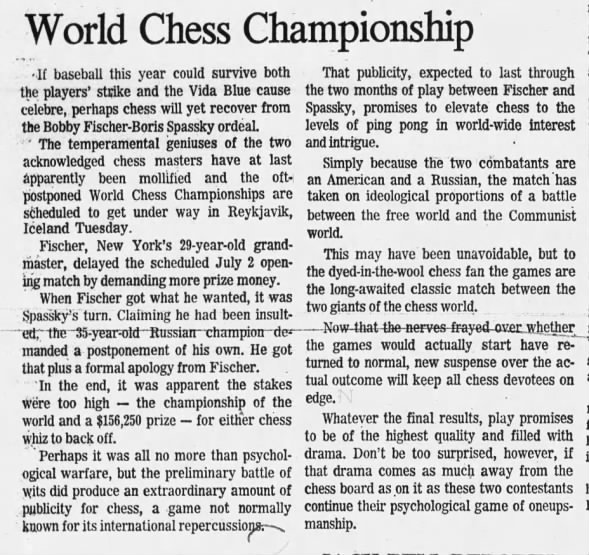 World Chess Championship 07 Jul 1972, Fri Oakland Tribune (Oakland, California) Newspapers.com
World Chess Championship 07 Jul 1972, Fri Oakland Tribune (Oakland, California) Newspapers.com
Daily News New York, New York Friday, July 07, 1972 - Page 326
Spassky to Go 1st Tuesday by Robert Byrne
Reykjavik, Iceland, July 6 — Bobby Fischer, debonair in a pale green suit, pointed to Boris Spassky's closed left hand tonight ([other reporters claim it was the right hand)] and discovered he had selected the black pawn concealed in it. That meant that Spassky, who smiled slightly as he opened his hand, will have the first move in the first game Tuesday of the 24-game world championship match.
The draw was made as Fischer, the American challenger, and Spassky, the Soviet world champion, stood face to face on the stage of the Laugardalshoell, Reykjavik's sport exhibition palace. But it was done in the same manner as park bench chess players, with Spassky taking a black pawn and a white pawn in each hand, juggling them behind his back and extending his closed hands to Fischer.
Fischer, the 29-year-old chess genius from Brooklyn, and Spassky, 35, of Moscow met for the draw after Fischer sent a handwritten letter of apology to Spassky this morning. In the letter Fischer asked the Russian to accept his apology for “my disrespectful behavior in not attending the opening ceremony.”
Fischer had delayed the opening of the match, scheduled for July 2, by haggling with the Icelandic Chess Federation over the proceeds of the match.
The stalemate over the money was broken unexpectedly Tuesday when British banker James Slater, an avid chess fan, offered to contribute $125,000 to the prize fund. Fischer then left New York for Reykjavik.
Slater's doubling of the original purse put up by the Icelanders will give the winner $156,250 and the loser $93,750—the biggest purse ever for a championship chess match.
Spassky, showing the strain of waiting out the pregame gambits, requested a delay of his own to repair his frayed nerves. Lothar Schmid of West Germany, the head referee, granted the request and set the first game for 5 p.m. Tuesday at Laugardalshoell.
After Fischer and Spassky met tonight for their first personal encounter since both arrived here, no more was heard of a Russian chess federation demand that Fischer be penalized by forfeiting the opening game.
In his letter to Spassky, Fischer explained his behavior by saying: “I simply became carried away by my petty dispute over money with the Icelandic Chess Federation.”
“I Have Offended You”
“I have offended you and your country, the Soviet Union, where chess has a prestigious position,” Fischer said.
“I know you to be a sportsman and a gentleman and I am looking forward to some exciting chess games with you,” he added.
Fischer also asked Spassky to withdraw the demand that he forfeit the first game.
The Town Talk Alexandria, Louisiana Friday, July 07, 1972 - Page 21
Chess Club Members Here to 'Compete' Against Players in World Title Match
The Cenla Chess Club will hold world championship instant-replay matches while the Fischer-Spassky Tournament for the chess championship of the world is going on, Tom Heston, club president, said today.
One player in a game will be allowed to use a cribsheet with the moves made by either Fischer or Spassky in their battle for the chess title. The other will use nothing but his own brains to respond.
Whoever draws white in the first game will start with the opening used by white in the Iceland tourney's first match. His opponent, playing with the black men, will be on his own. FOr the first few moves at least, until the black player gets hopelessly lost or confused, the game will be identical to the Fischer-Spassky match. In succeeding games the players will switch colors.
“The idea isn't to improve on the champions' ideas, Heston said, but to see how close we can come to thinking like they think.”
The chess club meets Saturday at 2 p.m. in the Checkmate Room of the Alexandria Motor Inn. Heston asked chess players to show up promptly at that time so no one will be left waiting for an opponent.
Club members also meet at each others' homes during the week “to play the world's oldest and most fascinating game,” according to Heston. He invited old members and new chess players to attend the Saturday meeting at the Checkmate, and to bring their own sets and clocks if they have them.
With the world championship tournament bringing the game of chess more publicity than it has had in the last several thousand years, Heston said that more people than ever are trying to learn the game. He said the fundamental moves can be learned in less than an hour, and club members are available to teach beginners.
“Of course, it takes longer to develop skill, but that's what the game is all about,” the club president said. “You constantly learn and grow, by matching your skill against others.”
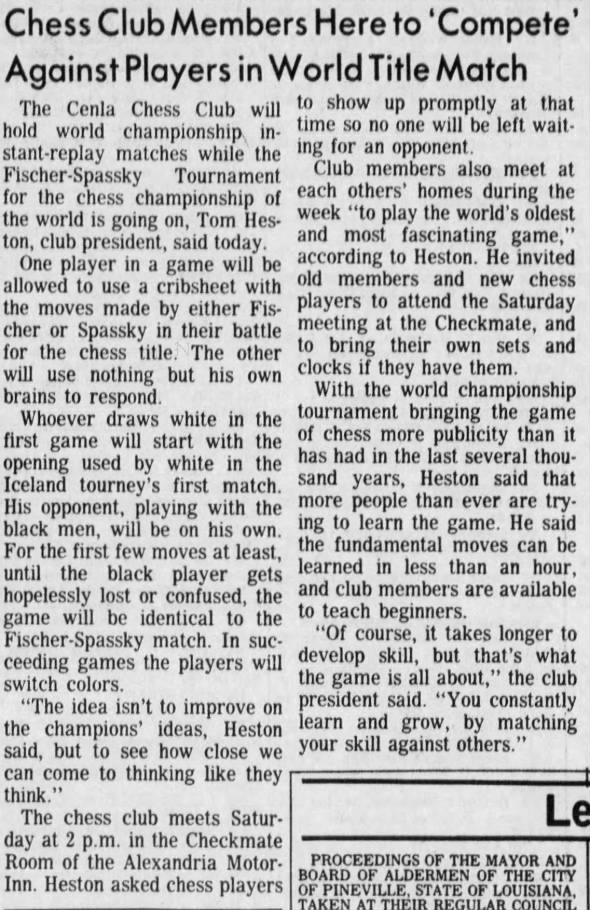 Chess Club Members Here to 'Compete' Against Players in World Title Match 07 Jul 1972, Fri The Town Talk (Alexandria, Louisiana) Newspapers.com
Chess Club Members Here to 'Compete' Against Players in World Title Match 07 Jul 1972, Fri The Town Talk (Alexandria, Louisiana) Newspapers.com
Fort Lauderdale News Fort Lauderdale, Florida Friday, July 07, 1972 - Page 88
ABC Sports
has acquired the exclusive rights to televise the World Chess Championship between challenger Bobby Fischer of the United States and champion Boris Spassky of the Soviet Union, it was announced today by Roone Arledge, president of ABC Sports.
The comprehensive coverage on the Television Network will be the only telecasts of the competition available in the United States.
Highlights of championship games, possibly as many as 24 in all, will be seen on “ABC's Wide World of Sports.” The championship will run a maximum of eights weeks; the first “Wide World” telecast will air Saturday (5 to 6:30 p.m.) on channels 10 and 12.
The World Chess Championship will be held in Reykjavik, Iceland, a country of devoted chess aficionados. This marks the first time in history the matches will be played outside the Soviet Union. ([In an island nation which is very much under the influence of the anti-American Soviet underbelly of U.S.S.R. propaganda]).
The first game was played Sunday, July 2; the second on Tuesday, July 4; the third on Thursday July 6. Thereafter, games will be played every Sunday, Tuesday and Thursday for eight weeks. Highlights will be seen on Saturday's “Wide World of Sports” program.
A maximum of 24 games will be played. As soon as one competitor earns 12½ points, the championship is decided and play is terminated. One point is awarded for a victory, a half point for a tie. Defending champion Spassky needs only a 12-12 tie to retain his world title.
Fischer, a prodigy who stunned the world by winning the United States national losing three games and tying twice between 1960 and 1970. Yet, following his relatively easy succession of triumphs in preliminary competition, Fischer is probably the favorite.
Spassky is the latest in a long line of Russian champions. A representative of the Soviet Union has held the World Championship for the past 23 years.
After much negotiating, Iceland became the host country for the matches, offering $125,000 in prize money. The winner will get $78,125; the loser the rest.
In addition to providing exclusive coverage of the actual play, ABC Sports will have interviews with Fischer and Spassky, coverage of their training methods and analysis of strategy and vital moves.
Fort Lauderdale News Fort Lauderdale, Florida Friday, July 07, 1972 - Page 4
It's Our Opinion: On Again, Off Again Chess Match Serves As Light Touch Amid Gravity
What started out as a healthy feud has turned into an international incident. The lines seem to be drawn, and the worst could happen.
Involved once again are the Soviet Union and the United States. The outcome of the conflict could be a crucial matter between the two giants.
What are we talking about? The world championship chess match in Reykjavik, Iceland, of course. That on-again, off-again, on-again chess match of the century between the world title holder, Boris Spassky of the Soviet Union, and American grandmaster Bobby Fischer.
The whole business appears to be a real good comedy, progressing according to a script written by somebody who hates chess.
But appearances can be wrong. While we appreciate the comic relief the situation affords in times of war, political campaigns and poor economic conditions, we feel all good things must come to an end.
There shouldn't be more than five acts in a comedy at most, and the new Icelandic saga is at least in its sixth. In time, the thing could become boring.
As it is, chess in its 1,500 years of known history has never received so much publicity. Bobby Fischer has been making headlines for quite a while now in this country, while Boris Spassky is doing pretty well in Pravda.
Bobby's delaying tactics, his holdout out for high prizes, his late arrivals in Iceland and devil-may-care attitude has not particularly endeared him to the Icelandic public which, we understand, is chess happy from the word go ([and not mentioned here, but a long long history of containing a deep anti-American, racist underbelly, that stretched all the way from the common peon to government officials making “secret agreements” with foreign officials to keep people of color, out of Iceland, so official Soviet policy, as supposedly the embodiment of “tolerance” and “anti-racist” is suspect, highly questionable. It's boycott of South Africa nothing but antics, as it cherry picked the racist island to host the 1972 championship, knowing its anti-American, anti-Bobby atmosphere to demoralize the Soviet opponent.]).
Bobby has became the bad boy ([anyone who brought such spotlight of criticism on the Soviet Empire's crimes, would be painted as a “bad” “public enemy #1” including their own chess players who failed to bring home the gold from tournaments abroad]) and Boris the good guy, Boris just said nothing and waited. But then his image changed when he walked out, demanded an apology from Bobby and, to everybody's surprise got it, and talked about insults to the Soviet Union ([scripted by Moscow propagandists working behind scenes]).
All this was great for the game of chess. From a match of deep thinkers it's been turned into a sort of brawl; it's become popular like any sport even for those who don't understand the rules.
What's more it's become a big money affair. So chess should be very grateful to Bobby Fischer. He has given it more oomph than any grandmaster, and that breed goes back to 1747. He has won more adherents to the noble game than any of his peers. And he has made a playing game a paying game.
In the world championship which is to go into weeks and weeks, months and months, of playing, thinking, delaying and moving chessmen around, the sum of $300,000 is the stake, with the winner getting 60 per cent of it. And that aint hay.
Bobby did that single-handedly. No grandmaster can live on fame alone, and publicity can't hurt.
So go to it, Bobby, and bring home the bacon.
 It's Our Opinion: On Again, Off Again Chess Match Serves As Light Touch Amid Gravity 07 Jul 1972, Fri Fort Lauderdale News (Fort Lauderdale, Florida) Newspapers.com
It's Our Opinion: On Again, Off Again Chess Match Serves As Light Touch Amid Gravity 07 Jul 1972, Fri Fort Lauderdale News (Fort Lauderdale, Florida) Newspapers.com
The Brandon Sun Brandon, Manitoba, Canada Friday, July 07, 1972 - Page 6
World Chess Championship: Play Will Begin Tuesday
Reykjavik, Iceland (CP) — World chess champion Boris Spassky of the Soviet Union and challenger Bobby Fischer of the United States agreed Thursday night to begin their long-disputed world championship match Tuesday.
The chess match became a reality when the Soviet champion and his American challenger met face to face to draw lots on who should play white in the opening game of the 24-game series.
Spassky won the draw, and will have the first move in the first game.
Tournament officials feared further disaster when the 29-year-old challenger kept the Russian champion waiting for more than a half-hour at the exhibition hall where the draw took place.
The champion arrived 10 minutes before the appointed time and Fischer more than 20 minutes late.
But the Russian appeared in an almost jovial mood as he and Fischer inspected the Icelandic stone chessboard on which the crucial matches will take place.
Fischer looked cool in a powder-green suit despite a harrowing experience on his arrival at the hall when he had to be rescued from reporters and fans who surrounded his car.
The decision to begin play Tuesday rather than Sunday came as a complete surprise.
There was no immediate explanation for the new date. But it was generally thought that Fischer had bowed to a request from Spassky, who is regarded as most likely to have suffered from the uncertainties of the last few days.
Thursday morning, Fischer apologized to Spassky in writing for “disrespectful behavior,” and the Soviet news agency Tass announced Thursday night that “all demands of the Soviet delegation have been satisfied.” ([but no apologies were offered about the Soviet sin of choosing an island which for decades had secret policies with other governments forbidding persons with shades of brown skin on their anti-American, pro-Soviet island. Nor apologizing for the Soviet's anti-Semitic stance, which had often labeled players like Sam Reshevsky who kept the Jewish Sabbath of Saturday, the “Reshevsky Problem” along with Fischer whom, in the meantime began practicing the doctrines of a Christian fundamentalist sect around 1962, which kept the same Sabbath. Soviet and Christian Dominated press painted Fischer and Reshevsky as “bizarre”, “eccentric” and “controversial” because one chooses to obey religious customs contrary to the Soviet Union or even Christian Fundamentalist dominated United States which gave not as much as a second thought to those who refused to play a chess tournament on Sunday out of religious devotion to attend to demands of Sunday-worshiping Protestant denominations. That is A LOT of plotting and discrimination swept under the rug! and erased from chess history. Very Troublesome … which led to pushing Reshevsky out of some matches, or in Fischer's case, either play, or forfeit … only then to be maligned in worldwide press by Soviet-sympathetic and Christian-Dominated fundamentalists affiliates in the press as “temperamental”.])
The apology opened the way for the start of the 24-game series, plagued by delay, confusion and bad feeling.
Fischer delayed the opening of the match, which was to have begun last Sunday, in a holdout for more money ([and rightly so, for if the match had been held in Australia before Euwe went back on his word, to offer the first half of matches on a “first come first served” bid basis, Australia was offering to fork up $225,000 and Mexico's bid at $175,000 … but Soviet arm-twisting knocked out the competition, to whittle the figure down to almost HALF the total prize potential. Fischer agreed only to play, “under protest,”]). The stakes then were an official purse of $125,000 and a share of TV and film receipts.
He decided to come—arriving Tuesday—only after British financier James Slater stepped in with a donation of $130,000 to sweeten the prize pot (and re-establish the total prize figures closer to what was legally bid by Australia and Mexico.])
The Morning Record Meriden, Connecticut Friday, July 07, 1972 - Page 6
The Ruckus in Reykjavik
There is plenty of hot water in Reykjavik these days and not all of it is in the city's famed thermal springs. A good deal of heat has developed around the world championship chess matches impending between Boris Spassky, Soviet Union, title holder, and Bobby Fischer, his American challenger.
The series of rages and outrages — Fischer's late arrival; his sulking over the size of the purse ([and justifiably so! considering Soviet tactics to cut the prize in half, by forcing Euwe to go back on his word to offer a “first come first serve” bid to other nations when Belgrade backed out, and Australia stepped up to the plate with a generous offer of $225,000 — with only 25k going toward organization expenses, with 200 grand in prize funds!]) the generosity of a London investment broker who donated $125,000 to swell the purse; Spassky's umbrage over what he considered Fischer's outrageous conduct ([Spassky was being used as a mouthpiece of the Soviet tyrants in Moscow. Either act the part of the puppet, or get “dragged on the carpet” along side Petrosian and Taimanov, which was inevitable, anyway]) — all of these incidents contributed to the heat and confusion and brought the championship series to the brink of cancellation.
Then, suddenly, Fischer apologized not only verbally but in writing to Spassky, expressing regret for his “disrespectful behavior.” He was carried away, he said, by his “petty dispute over money with the Icelandic chess organizers,” ([which would've never happened had Australia or Mexico been permitted to host the first half of the matches which came up for bid, as Euwe had given his word, “first come, first served” basis, until the Soviet Empire's intolerant regime snuffed out all outside competition with a demand to monopolize the entire match under Soviet control in racist and anti-American Iceland, which was necessary to achieve near-total censorship of the tournament, as possible. This was ultimately achieved by a “between the lines” contract with Chester Fox which forbid photography in the Sports Hall. Fischer did not order this unorthodox move, instead, Fischer was among the outraged that the Icelandic Chess Federation sold all photography rights (which every one agreed, including photographers and journalists from world media, abroad to be excessive, and an unusual action). Then, by employing noisy camera men, the Soviet was naturally depending upon Fischer to demand their removal from the hall. (See Fischer's interview, in his own words.) Thus, achieving the Soviet's goal of total black out of coverage, with their “Soviet Censorship Gambit”.])
Chess champions have always enjoyed great prestige in their field, but little in terms of financial reward. The world's championship, held since 1948 by Soviet players, has usually carried a purse of only a few thousand dollars. Now, thanks to Fischer's intransigence and the generosity of the private sponsor from London, the winner will receive $231,250, the loser $168,750 in the impending championship series.
Spassky and Fischer are scheduled to play 24 games on the table of Italian marble in the Reykjavik Sports Palace which seats 2500 persons. The moves will be watched intently and reported around the world. The winner will be determined on a point system.
The last American to hold the world's chess championship was the brilliant Paul Morphy (1837-1884), a young genius from New Orleans. Now another young American is again challenging a champion, a young man not much older than he. The two men play different styles; Spassky is more conventional; Fischer more innovative and daring. The two are worthy opponents. One may hope that there will be no more interruptions and that the games will go forward without complaint or acrimony as befits the royal game of chess.
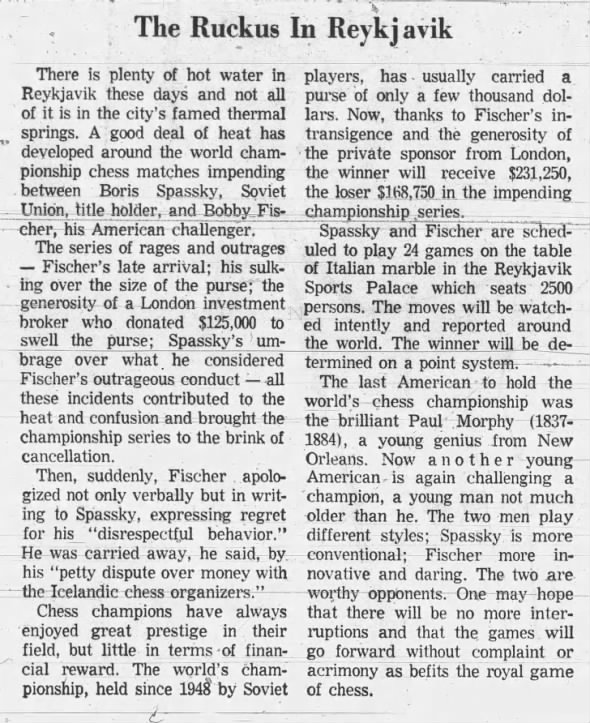 The Ruckus in Reykjavik 07 Jul 1972, Fri Record-Journal (Meriden, Connecticut) Newspapers.com
The Ruckus in Reykjavik 07 Jul 1972, Fri Record-Journal (Meriden, Connecticut) Newspapers.com
The Capital Times Madison, Wisconsin Friday, July 07, 1972 - Page 37
Chess Championship Highlights on Channel 27
Highlights of the World Championship Chess Tournament between challenger Bobby Fischer of the United States and champion Boris Spassky of the Soviet Union will be telecast on ABC's “Wide World of Sports” Saturday at 4 p.m. on Channel 27.
The championship games, which will run a maximum of eight weeks, are being held in Reykjavik, Iceland. This is the first time in history the matches will be played outside the Soviet Union.
A maximum of 24 games will be played. As soon as one competitor earns 12½ points, the championship is decided and play is terminated. One point is awarded for a victory, a half point for a tie. Defending champion Spassky needs only a 12-12 tie to retain his world title.
Fischer, a prodigy who stunned the world by winning the United States national championship at the age of 14, has faced Spassky only five times in his career and has never won, losing three games and tying twice between 1960 and 1970. Yet, following his relatively easy succession of triumphs in preliminary competition, Fischer is probably the favorite.
Spassky is the latest in a long line of Russian champions. A representative of the Soviet Union has held the World Championship for the past 23 years.
The two players will split a $250,000 purse and will receive $75,000 each for TV and radio rights.
In addition to providing exclusive coverage of the actual play, ABC Sports will have interviews with Fischer and Spassky, coverage of their training methods and analysis of strategy and vital moves.
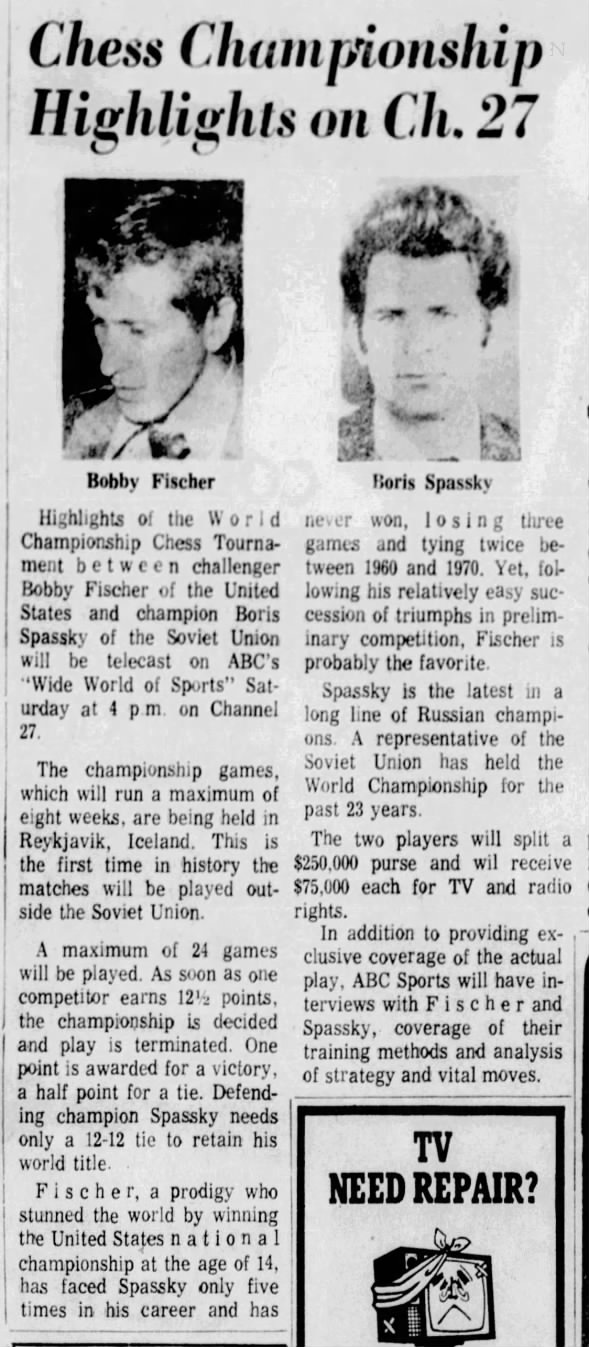 Chess Championship Highlights on Channel 27 07 Jul 1972, Fri The Capital Times (Madison, Wisconsin) Newspapers.com
Chess Championship Highlights on Channel 27 07 Jul 1972, Fri The Capital Times (Madison, Wisconsin) Newspapers.com
The Montgomery Advertiser Montgomery, Alabama Friday, July 07, 1972 - Page 4
The Chess War
IN THE LONG cold war between American chess player Bobby Fischer and defending champion Boris Spassky of the Soviet Union, the world has seen in microcosm just how difficult international diplomacy is.
There have been charges of capitalistic chicanery against Fischer, wounded pride on both sides, silly arguments, disputes over protocol and agenda, boycotts, etc.
The funniest aspect of the imbroglio was the charge in Moscow that a group of Americans had set up a computer in New York to assist the 29-year-old U.S. star.
There was no explanation as to how this would be accomplished, except that the American secret weapon would somehow be fed each move, analyze the situation and relay advice back to Fischer by some mysterious means.
The charge brought hysterical laughter among the chess experts in Iceland, including the referee of the match, Lothar Schmid, who said “that's nonsense.”
Even a member of Spassky's entourage, laughing with the rest, doubted that the system would work even if it did exist, since computers play “very bad” chess.
In any case, the impasse, while it lasted, gave the world an insight into the difficulties arising between competing individuals and thus between nations with conflicting interests on a far larger scale.
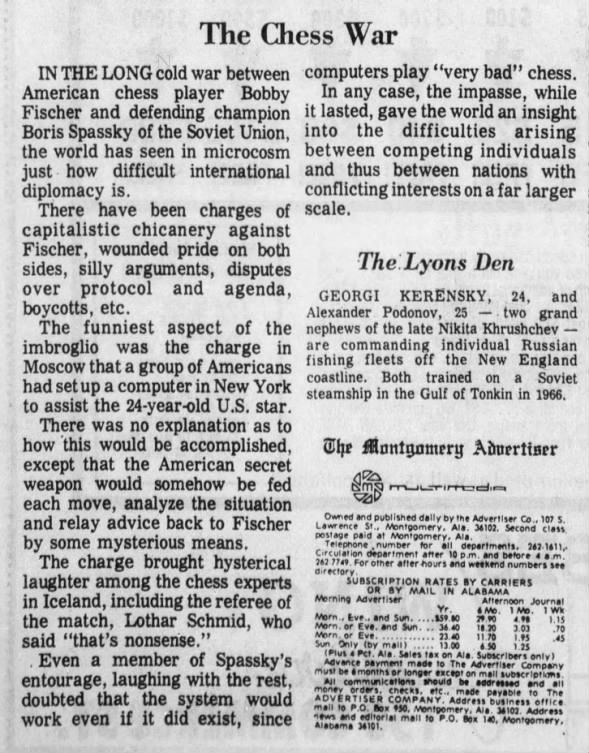 The Chess War 07 Jul 1972, Fri The Montgomery Advertiser (Montgomery, Alabama) Newspapers.com
The Chess War 07 Jul 1972, Fri The Montgomery Advertiser (Montgomery, Alabama) Newspapers.com
Press-Telegram Long Beach, California Friday, July 07, 1972 - Page 51
Chess May Never Be Quite The Same
Throw away your rooks and your pawns, your bishops, knights, queens and kings. Chess will never be the same, not with television moving into the act.
Television devours a sport, chewing it and shaping it to the limitations of its appetite, then spits it out, lifeless and devoid of soul. There was a time when chess could be used as an excuse to polish off a friendly fifth, all the while appearing to be immersed in a deep thought. No longer.
Chess players will have to learn to make a move every 20 to 30 seconds because television can not cope with dead time. Then, too, there will be a fellow in a red shirt running into the scene to direct the participants to take a timeout while an underarm deodorant is sold on the tube.
You can expect Howard Cosell to become very quickly the grand master of chess. Can't you hear him now, asking the Russian, Boris Spassky, “You realize, of course, that your opponent, Bobby Fischer, hates all your system of government stand for?”
There will be a Dandy Don and a Frank Gifford to serve as props for Cosell. Kids will emulate Fischer, holding out crankily for more money when Grandpa suggests a friendly match.
The first bubble gum cards aren't far away, either. Oh, for the good old days. Anyone for checkers?
AIR WAVES: The first telecast of the Fischer-Spassky duel was scheduled for Wide World of Sports on Saturday. But any live venture of this sort was scrubbed by the postponement of the first confrontation until Tuesday in Reykjavik, Iceland. Channel 28 also plans coverage, but its plans were uncertain at press time …
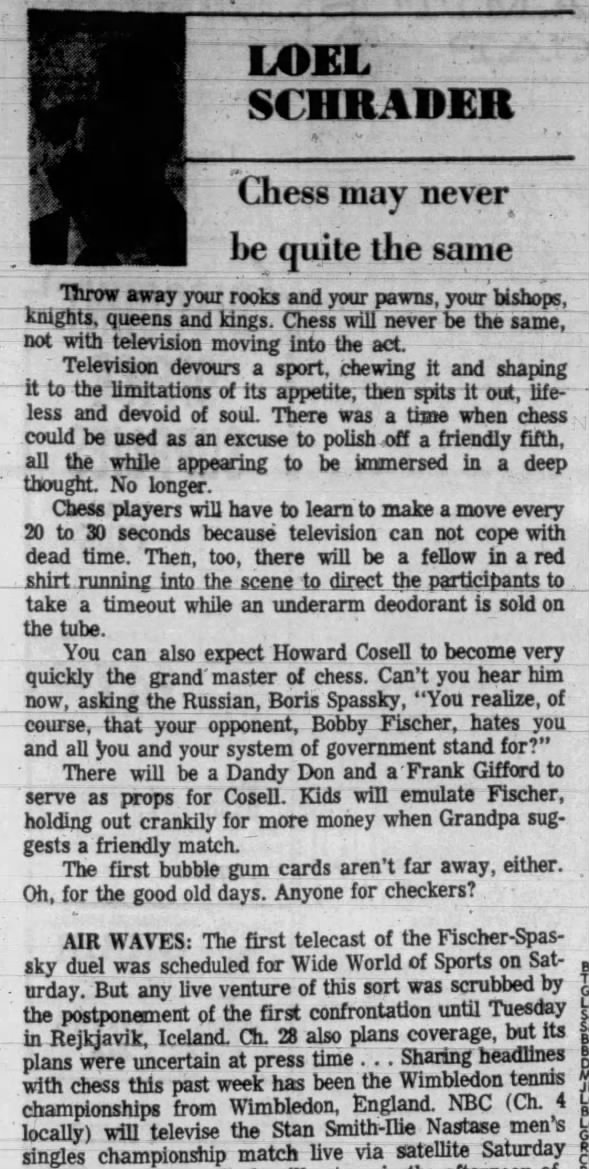 Chess May Never Be Quite the Same 07 Jul 1972, Fri Press-Telegram (Long Beach, California) Newspapers.com
Chess May Never Be Quite the Same 07 Jul 1972, Fri Press-Telegram (Long Beach, California) Newspapers.com
The Lowell Sun Lowell, Massachusetts Friday, July 07, 1972 - Page 6
Letters To The Sun: Blaming the Russians
Lowell — Recent press coverage of Robert Fischer, an American, in his challenge for the title “World Chess Champion” has struck this American as biased.
Fischer, after all, is an individual, materially disadvantaged, a challenger unsupported by any group or government, bargaining against:
1. The Russian Government (we all know Spassky doesn't make “a move” without first consulting his government).
2. The Icelandic Government (are they truly neutral?)
3. FIDE—the international chess federation (known to be Russian dominated).
According to our President it is not easy to bargain with the Russians when they hold an advantage.
Can we not extend to our countrymen at least the benefit of doubt (all the facts not being available) when he is negotiating alone against such formidable opposition?
It seems to this American that it is the Russians who want out of this match (Fischer, an American, having routed the best in the world an unprecedented 25 out of his last 29 games!) and are provoking Fischer into a situation in which they won't have to put the title on the line and will be able to save face in so doing.
Spassky's refusal to play, without stating any conditions or substantial reasons can be interpreted as further provocation.
I ask the press of this country why Spassky (and the Russians) are not being chastised in the media for their well considered shenanigans, as Fischer was [when] he delayed the match?!
Steven Edelblum, 332 Andover Street.
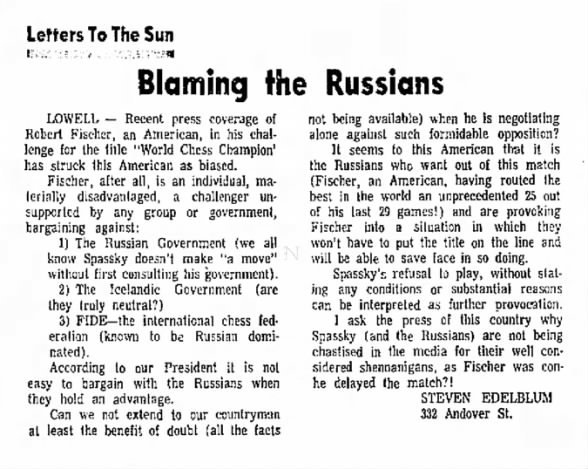 Blaming The Russians 07 Jul 1972, Fri The Lowell Sun (Lowell, Massachusetts) Newspapers.com
Blaming The Russians 07 Jul 1972, Fri The Lowell Sun (Lowell, Massachusetts) Newspapers.com
Statesman Journal Salem, Oregon Friday, July 07, 1972 - Page 4
Free Punch?
A few days ago, the Statesman chided Bobby Fischer for his poor sportsmanship in refusing to honor his earlier agreement to participate in the World Chess Championship in Iceland ([Not true. Fischer never made any formal, signed contract with the organizers, beyond a simple, agreement to play “under protest.”])
In response to Fischer's goading, however, Boris Spassky, the Russian world champion, has not only asked Fischer for a written apology but demanded that he forfeit the first game. This begets a plague-on-both-your-houses response.
In the past, the pre-fight jockeying between boxers have been used to drum up public interest, but never has one fighter suggested that his opponent forfeit one round or permit him a free punch.
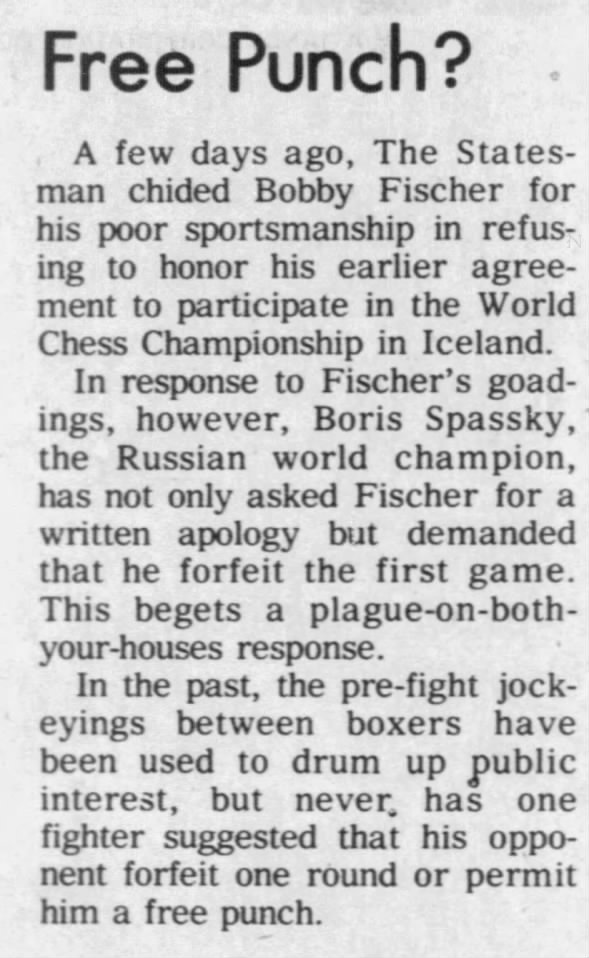 Free Punch 07 Jul 1972, Fri Statesman Journal (Salem, Oregon) Newspapers.com
Free Punch 07 Jul 1972, Fri Statesman Journal (Salem, Oregon) Newspapers.com
The Brattleboro Reformer Brattleboro, Vermont Friday, July 07, 1972 - Page 4
'Mr. Fischer seems to be ready now … Shall we commence, Mr. Spassky?'
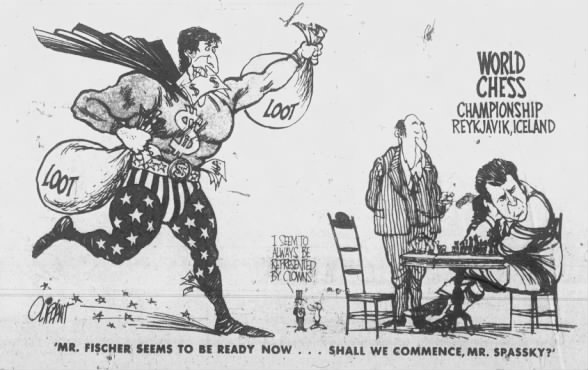 World Chess 07 Jul 1972, Fri The Brattleboro Reformer (Brattleboro, Vermont) Newspapers.com
World Chess 07 Jul 1972, Fri The Brattleboro Reformer (Brattleboro, Vermont) Newspapers.com
The Miami Herald Miami, Florida Friday, July 07, 1972 - Page 114
Scratch Chess As A 'Game'
THESE days, not even so cerebral and sedentary a game as chess can be played without a thunderclap or two.
Chess had seemed so noble a pastime, suited to long periods of staring and thinking, conducive to grand strategies and great wars within but a nutshell of space. Armies could be sacrificed even while a yawn was savored and extended to its satisfying limit.
Now the trumpets must sound across the checkered board too. The money-changers and politicians want the proper proportions of coin and propaganda.
For Bobby Fischer and Boris Spassky, the register must ring and national pride must unfurl. Like the other games, chess as they now will play it becomes something less than a game; not a delight but another grim part of survival.
We lament the passing of true games, in Iceland and elsewhere, on the checkered board and off, and in particular regret the passing of that sense of noble luxury that came as international chess masters bent with joy to the task of being wastefully and irrelevantly clever.
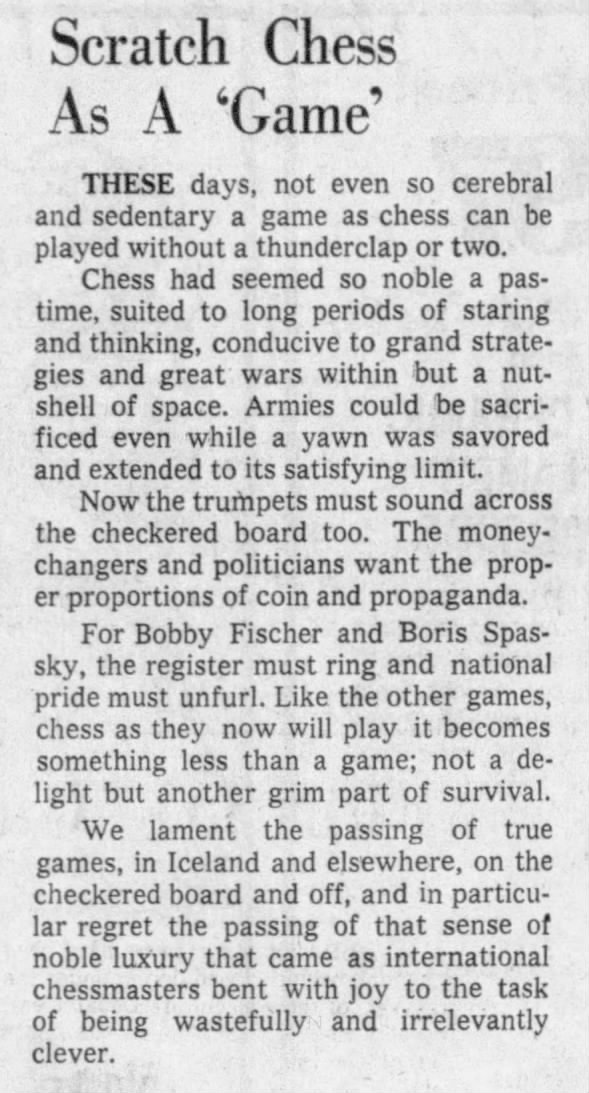 Scratch Chess As A 'Game' 07 Jul 1972, Fri The Miami Herald (Miami, Florida) Newspapers.com
Scratch Chess As A 'Game' 07 Jul 1972, Fri The Miami Herald (Miami, Florida) Newspapers.com
The Windsor Star Windsor, Ontario, Canada Friday, July 07, 1972 - Page 8
Long-Awaited World Chess Championship
The long-awaited world chess championship match set to begin Sunday between Bobby Fischer and Boris Spassky even has Windsorites involved. Or at least those Windsorites who shop at Smith's of Windsor.
A bell was rung with the announcement that the argument over money was settled when British financier James Slater offered to sweeten an already record pot with a donation of £50,000—roughly $130,000. Fischer responded by saying he would play.
Within recent months, Smith's of Windsor, along with the other 39 stores in the Gordon Mackay and Stores Ltd. chain, has become part of the United Kingdom-based holding company, Slater, Walker of Canada Limited, a subsidiary of Slater-Walker of Great Britain.
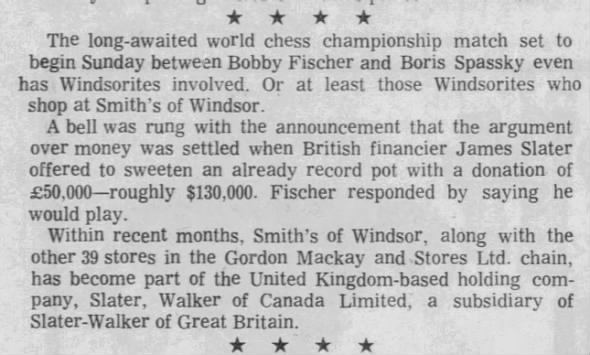 The Long-Awaited World Chess Championship 07 Jul 1972, Fri The Windsor Star (Windsor, Ontario, Canada) Newspapers.com
The Long-Awaited World Chess Championship 07 Jul 1972, Fri The Windsor Star (Windsor, Ontario, Canada) Newspapers.com

















